A disco ball. Bell-bottoms. Karaoke. A glass of whiskey. Maybe two. Maybe the entire bottle. Hangover. A lost soul. A recovered shoe. Hot bodies. Red lips. Cold body. Blue lips.
A city brimming with anger. A city about to blow the lid. Burly workers. Arrogant brats. Pipe dreams. Grim memories. A crabby reality. Voices on the street. Voices in my head. Drugs, drinks.
Empty bottles.
Expect all this and much more in Estonian video game Disco Elysium that launched mid-October. The game is an isometric RPG, where you play as a detective with a case of amnesia. You wake up in a rundown hotel room with no clue as to who you are and how you got there. Those questions are soon forgotten because…
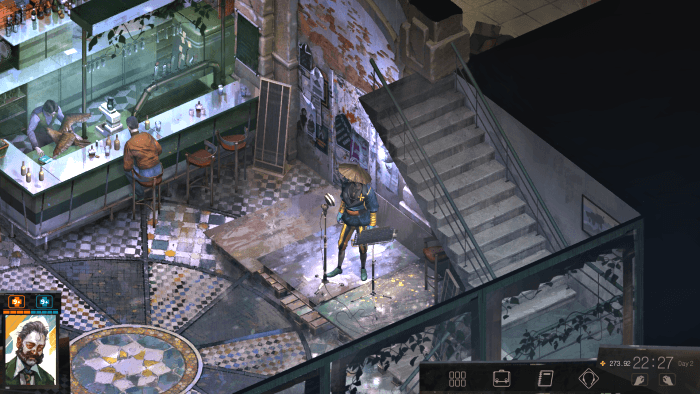
…a lifeless body has been hanging from a tree behind the house for some time. And the currently nameless detective tasked with looking into the case has been slacking off all weekend. Lots of booze and copious amounts of drugs mixed with suicidal thoughts. Not a great combo.
The hung-over and blotchy-faced cop is sent reinforcements from another precinct at the start of the week. Kim Kitsuragi from the 57th precinct is not messing around and tries (with little success) to guide the protagonist back on the righteous path.
The two take to the woeful and miserable streets of Martinaise district in Revachol to find answers. To their joy and grief, Martinaise is brimming with vagrants, people broken by the system, frustrated workers, racist pricks, drugged up youths, gang members, mercenaries, corrupt public officials and reservists living in the past.
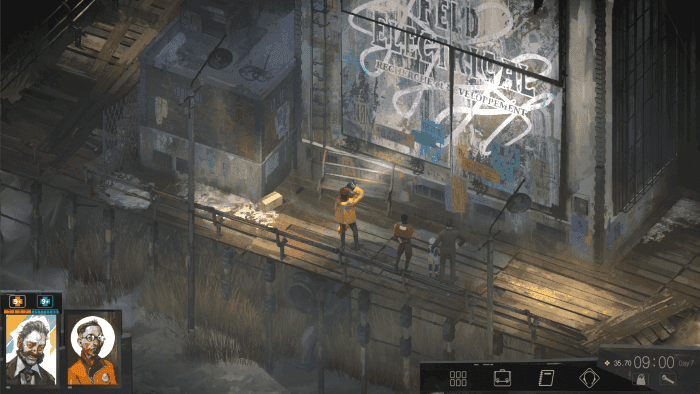
Although the atmosphere is generally grim that doesn’t mean that every conversation necessarily pushes the protagonist closer to the edge. Some happier moments, when the rampant nihilism is forgotten crop up from time to time. The sun occasionally peeks out from behind the clouds. The protagonist’s constant companion Kim Kitsuragi and certain citizens are amiable and kind-hearted characters that remind us that not all is evil and rotten. Hope is not lost.
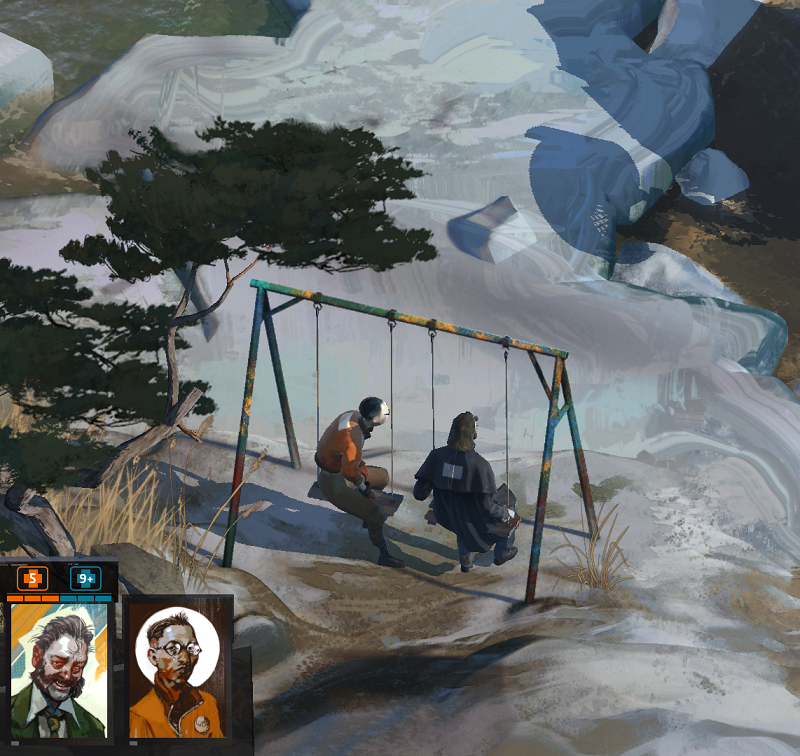
What is lost, though (on top of any memories) is the protagonist’s badge and gun. This is just one of many smaller and greater pieces in the game’s enormous narrative puzzle. If I wore hats, I would tip my hat to Robert Kurvitz and the other writers for the impeccable script that manages to be simultaneously sad, melancholic and incredibly comical, without ever being banal – the humour is educated, witty and often on the darker side.
Let’s be honest, if the script were anything less, the game might easily have been a flop. After all, the game relies heavily on reading and making dialogue choices. Don’t expect to be aiming any weapons, memorizing combat combos or experiencing adrenaline packed car chases. In this game, text is everything. However, that doesn’t mean that Disco Elysium fails to bloody the characters’ knuckles or leave their weapons holstered. It’s just that all conflicts are resolved through print and success is determined by the character’s skills (that talk to the protagonist).
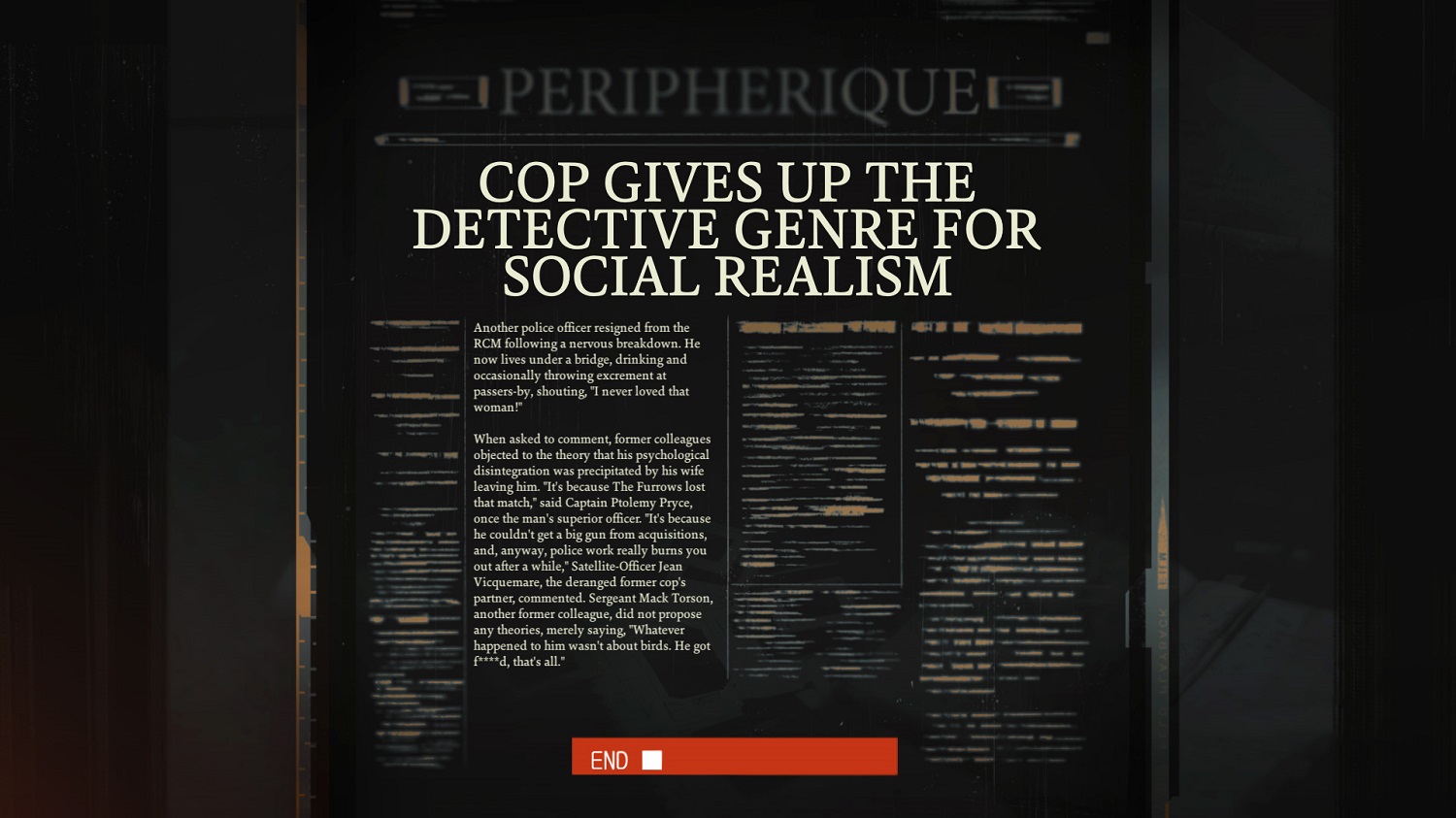
The player’s first task isn’t to recover a pair of missing pants but to decide on the character of the man that will be wearing said pants. There are three archetypes to choose from – the tough but dim brawler, the spiritual soul detective, and the Sherlock Holmes type intellectual.
Your skills will depend on the selected archetype and are divided into four categories: intellect (that determines how smart you are), psyche (that lets you talk to the city), fysique (improves the protagonist’s stretch and pain tolerance) and motorics (that keep the protagonist nimble and sharp). For example, if you decided to embark on the journey as a rough but thick cop, your physical skills will be primary and you may (or may not) want to put most of your XP towards developing those skills.
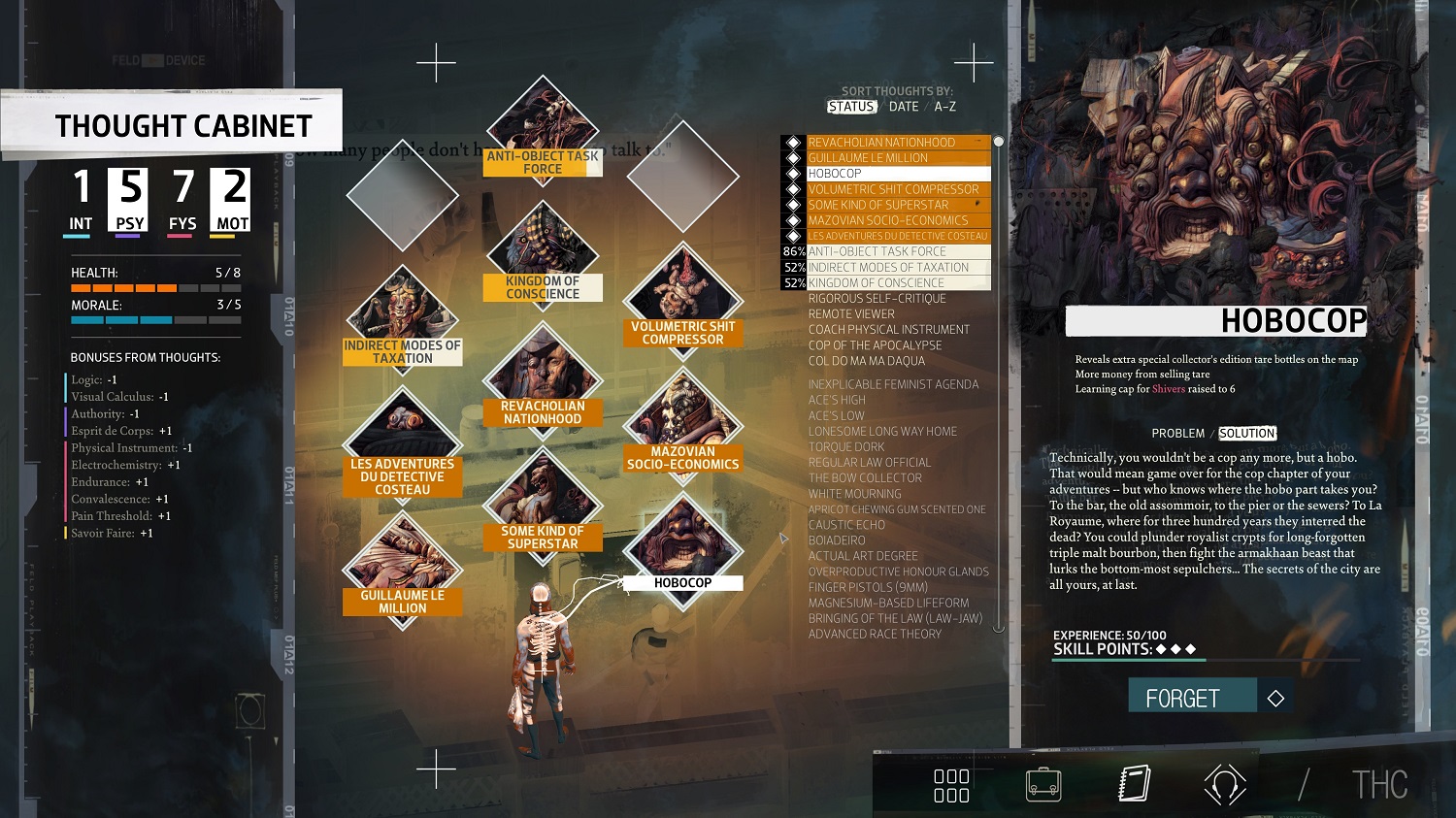
Each skill has a different goal and personality. Yes, personality. The skills not only talk to the protagonist but sometimes also quarrel with one another. For instance, Electrochemistry might demand that the protagonist self-administer large quantities of drugs at once. Logic, on the other hand, will counter that there are better ways to preserve one’s sanity. Funnily enough, both are in a way correct.
The irony lies in the fact that the protagonist will have the chance to indulge in a variety of illegal (and not so illegal) substances throughout the game. Alcohol, cigarettes, speed, to name a few. Some will increase the amnesiac cop’s intelligence, while other improve motor skills. But nothing comes without risk – one option puts you at risk of a heart attack and the other could deal a potentially devastating blow to your morale. Luckily the negative effects can be countered with legal drugs. Thanks, Big Pharma!
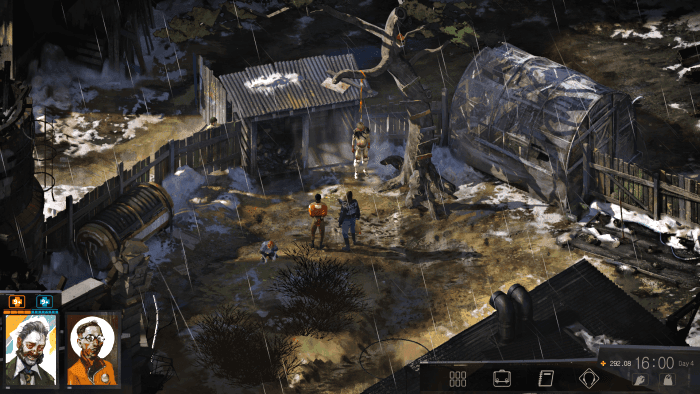
The clothes that the alcoholic lawman with the mysterious past wears are equally important. Each gets a say in which skills take priority and which suffer a blow. If that wasn’t enough, your Thoughts (yes, with a capital T) also sometimes interfere with your skills and other aspects of gameplay.
At its most basic level, the Thought Cabinet is a menu item that lets you plant ideas. The ideas appear in conversations with other characters or as sudden bouts of inspiration. Sometimes these can help you progress and at other times seem completely useless. Ideas take varying time to develop and can also have negative effects; but when an idea is nice and ripe, it’ll usually provoke positive emotions (read: grant you bonuses).
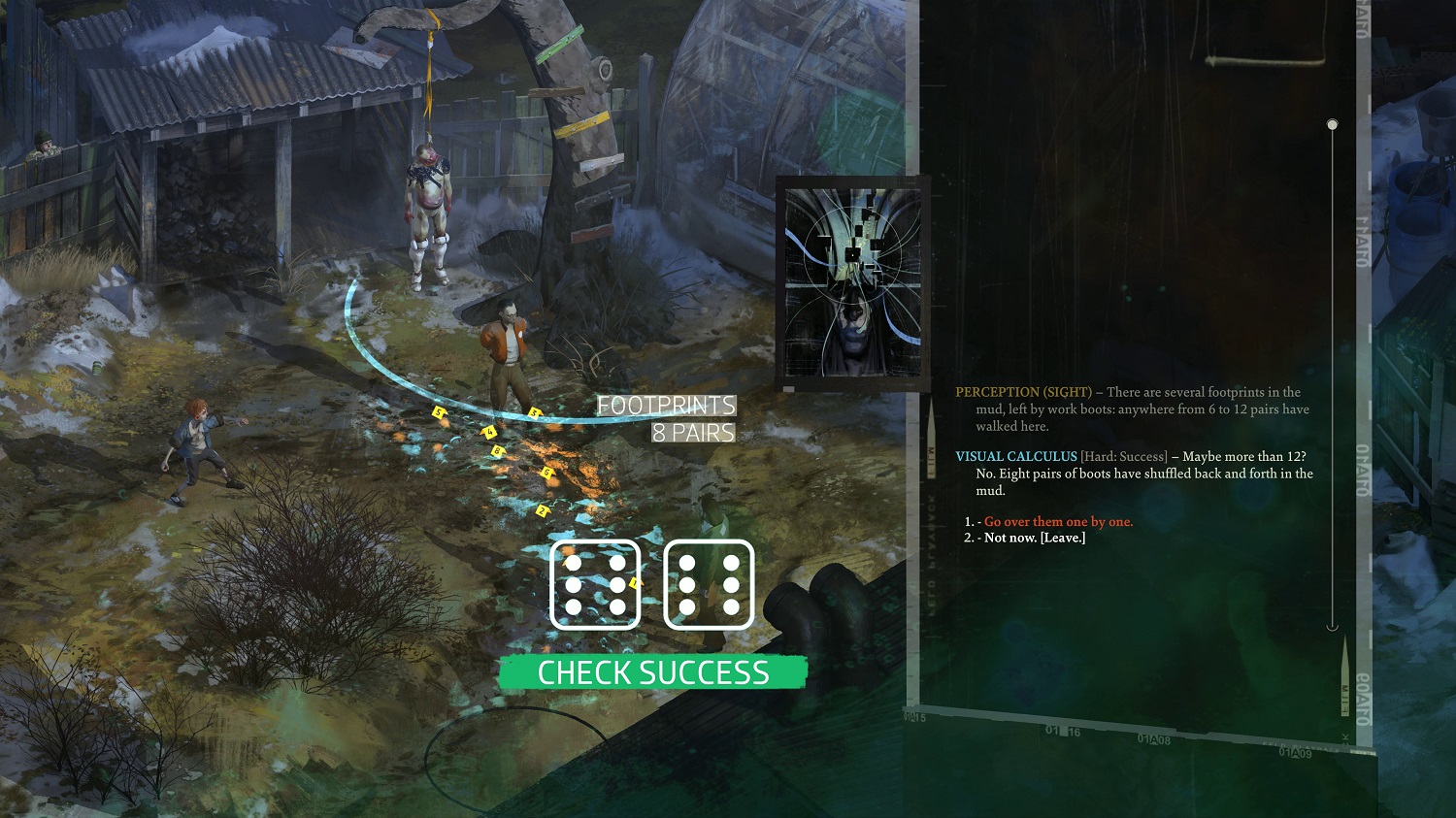
Now that I’ve gone on and on about the game’s mechanics, I absolutely have to mention how amazing the game looks. Martinaise and the areas surrounding it might be rundown and dilapidated but the visuals truly bring everything to life. The pastel tones and striking style set Disco Elysium apart and make it one of the more unique digital masterpieces of this year. The brush strokes of art director Aleksander Rostov and other artists were equally captivating one minute and 35 hours into the game when the end credits began rolling.
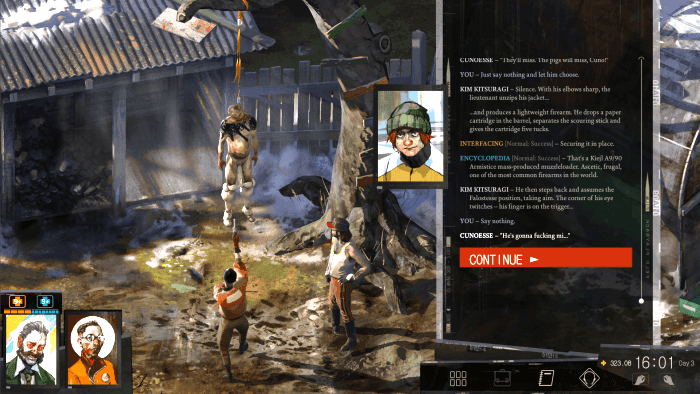
I am positively blown away at how a studio’s (where many on the team were new to the gaming industry) debut game can be this prodigious. However, some things do deserve criticism. The first is the apparent bottleneck at the end of the narrative. Although Disco Elysium encourages players to make choices and my protagonist and journey are not the same as someone else’s, all players share one certain moment. The situation requires the player to pass a check for a particular skill regardless of the selected archetype and skills. This was somewhat disappointing for an otherwise incredibly open game.
The quality of the voice acting also comes to mind. It’s obvious that not all characters have been recorded at the same studio. This can cause a dissonance in dialogues, especially when the (almost) ever-present Kim Kitsuragi enters a conversation. Compared to Kim’s soft and muted speech, the other characters can sound raspy and resounding.
The latter is a pity, since the voice acting is otherwise top par. Granted, you may catch the occasional amateur performance, but even those somehow sound …natural. Excellent performances include Kim Kitsuragi, the arrogant drug thug Cuno, and Measurehead, who is voiced by rapper Dizzy DROS.
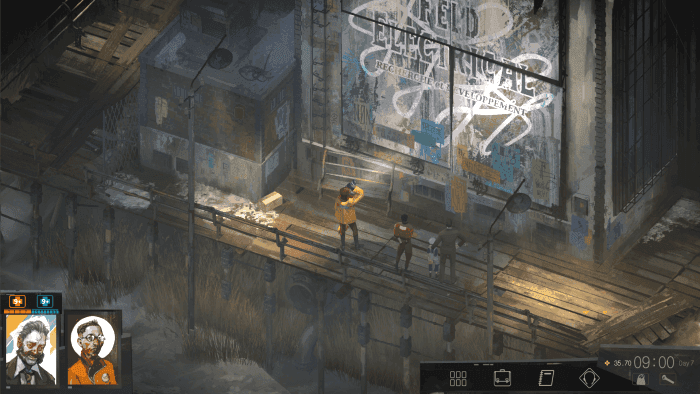
My biggest compliments go to Mikee W. Goodman who performs a lengthy monologue at the start of the game. I’ve listened to it later on several occasions and get goose bumps every time. Outstanding! Yes, technically it’s a dialogue, but Mikee voices both the protagonist’s Ancient Brain and the interlocutor, the Limbic System (that’s a… that’s a brain thing, trust me). Even thinking about that conversation gets me really (positively) bothered. And while we’re on the topic, the game’s dynamic musical score created by British Sea Power also deserves a mention.
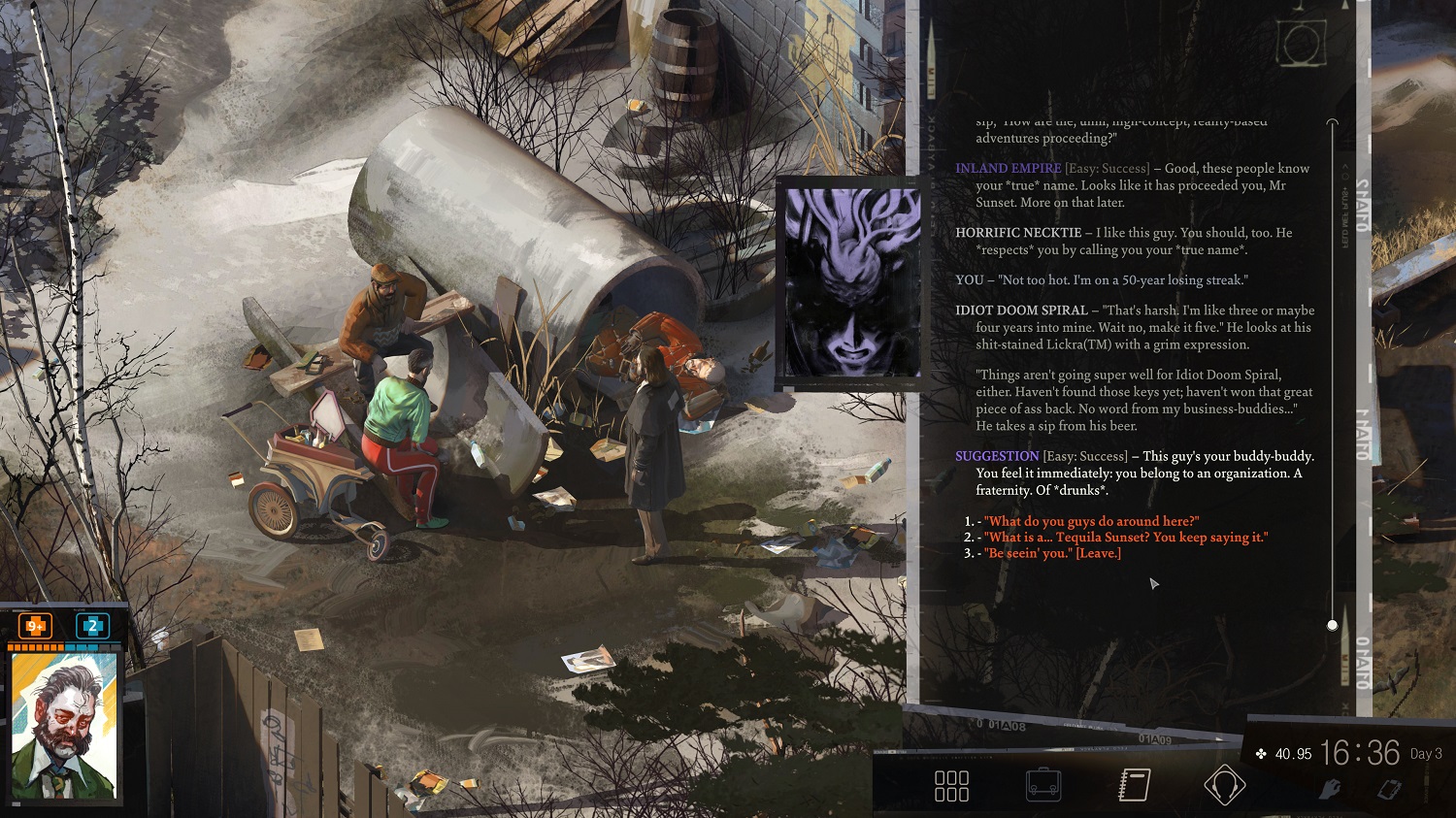
Disco Elysium is undoubtedly one of the coolest games this year and gives a number of AAA games a run for their money. An incredible script and breath-taking art outweigh any minor glitches. The studio has made a phenomenal debut, and I’m not just saying that because the project has its roots in Estonia.
The fact that Disco Elysium has launched Estonia into video game stardom is just the cherry on top!
Full disclosure: Mikk Metsniit, Head of publishing at ZA/UM, is a former member of Level1
Värske ⚡
-
PlayStation 5 eksklusiivmäng Marvel’s Wolverine ilmub kaks kuud enne GTA 6-te
Aastaid tagasi välja kuulutatud PlayStation 5 eksklusiivmäng Marvel’s Wolverine sai lõpuks ometi konkreetse ilmumiskuupäeva. Hea …
-
Sony sulgeb mängustuudio, kes loonud PlayStationi parimad uusversioonid
Sony teatas, et sulgeb neile kuuluva mängustuudio Bluepoint Games uksed. Sony ostis stuudio 2021. aastal. …
-
Xboxi tulevik muutus kardinaalselt – Phil Spencer läks pensionile, uueks juhiks sai AI-entusiast
Viimase aasta jooksul on Xbox teinud mitmeid möödalaskmisi, mis brändi mainet kahjustanud. Nüüd üritatakse probleemi …
